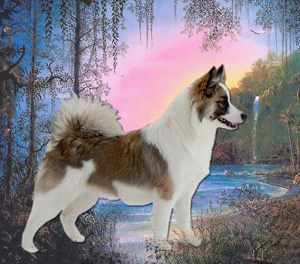
Icelandic Sheepdog
Group: Herding Group
Origin: Iceland
Height: 15 to 19 inches (38-48 cm)
Weight: 25 to 35 lbs (11.5-16 kg)
Also Known As: Icelandic Spitz; Iceland Dog

SkinDeep’s Saga To Eclipse “Sage”
Photo:
Eclipse Reg’d Boston Terriers & Icelandics
CLICK HERE to View Breeder Listings
Breed Profile
The Icelandic Sheepdog, or Iceland Dog as he is also known, is believed to be a descendant of small herding dogs brought to Iceland during the time of colonization by the Vikings.
He is an intelligent, lively and affectionate dog and, like most Nordic Spitz breeds, he enjoys the outdoors and regular exercise. He has great self-esteem, determination and endurance, capable of solving many tasks. Used as a guard dog and protector of sheep and lambs from birds of prey, he has excellent eyesight and characteristically observes and barks at everything that approaches from above. Because of his non-aggressive and friendly nature, however, he is not a guard dog but rather a very good watchdog who will always bark an alarm to protect everything that he considers his territory, including property and small animals.
He has a triangular muzzle, erect ears and the typical Spitz tail which curls and touches the back. His coat is water resistant, thick and coarse either wheaten, wolf-sable, black or off-white and often with white markings and a black mask.
Health Issues
The Icelandic Sheepdog is known to be a very healthy and long lived breed with average life expectancy of 12 to 16 years. However, like all breeds of dogs, the Icelandic Sheepdog is known to have some health problems, including:
- Hip Dysplasia
- Distichiasis — This is thought to be a hereditary eye disorder. Distichiasis occurs when a hair or hairs grow in the band of the eyelid causing irritation to the cornea.
If you are considering the adoption of a Icelandic Sheepdog puppy, or any breed, it is very important to be selective in choosing a responsible and reputable breeder. Ensure that the prospective puppy’s parents have all health clearances, this should include hip x-rays and eye clearances for all breeding stock. Breeding of any dog should not be done until after they have been proven to be free of evidence of significant hereditary diseases. (For more information on selecting a breeder, see the articles on the main General Information page.)
Additional Health Resources:
- Health and Nutrition — Growing section of the Canada’s Guide to Dogs website which includes information on several health and nutrition related issues.
- Canine Health Information Center (CHIC) — Providing a source of health information for owners, breeders, and scientists that will assist in breeding healthy dogs. CHIC is a centralized canine health database jointly sponsored by the AKC/Canine Health Foundation (AKC/CHF) and the Orthopedic Foundation for Animals (OFA).
- AKC Canine Health Foundation — Working towards developing scientific advances in canine health.
- OFA – Companion Animal Eye Registry (CAER)
- Orthopedic Foundation for Animals (OFA)
- Ontario Veterinary College (OVC)
- University of Pennsylvania Hip Improvement Program (PennHip)
- HealthGene — HealthGene Corporation is the leading provider of veterinary DNA diagnostic services in Canada.
- Labgenvet — Laboratory of Veterinary Genetics is a Canadian diagnostic laboratory that offers a comprehensive service of DNA tests for veterinary genetic diseases.
Breed Standards
- CKC Breed Standard – From the Canadian Icelandic Sheepdog Club
- AKC Breed Standard
- UKC Breed Standard
- FCI-Standard No. 289
Grooming Information
- Grooming — This section of the Canada’s Guide to Dogs website includes tips, articles and information covering all aspects of dog grooming along with a listing of Groomers from across Canada.
Training Resources
- Training — For training information, see this growing section of the Canada’s Guide to Dogs website for tips, articles, as well as listings of training centres across Canada.
Additional Information
- Is a Dog from the Herding Group Right for You?
- Clubs, Sports & Activities — For information on the many sports and activities you can get involved in with your dog.
- Working Dogs — The Working Dogs section of the Canada’s Guide to Dogs website provides information and listings of organizations that are involved in various dog jobs, such as Guide Dogs, Therapy Dogs, Police Dogs, Protection Dogs, and much more.
*NOTE 1: CHIC – The Canine Health Information Center “is a database of consolidated health screening results from multiple sources. Co-sponsored by the Orthopedic Foundation for Animals (OFA) and the American Kennel Club (AKC) Canine Health Foundation, CHIC works with parent clubs to identify health screening protocols appropriate for individual breeds. Dogs tested in accordance with the parent club established requirements, that have their results registered and made available in the public domain are issued CHIC numbers.” To learn more, visit: www.caninehealthinfo.org
*NOTE 2: The Fédération Cynologique International (FCI) is the World Canine Organization, which includes 91 members and contract partners (one member per country) that each issue their own pedigrees and train their own judges. The FCI recognizes 344 breeds, with each being the “property” of a specific country. The “owner” countries write the standards of these breeds in co-operation with the Standards and Scientific Commissions of the FCI, and the translation and updating are carried out by the FCI. The FCI is not a breed registry nor does it issue pedigrees.
Breed Listing
Quick Links
Get In Touch
- Email: canadasguidetodogs@gmail.com
- Email: info@canadasguidetodogs.com
- Visit us on Facebook: www.facebook.com/CanadasGuideToDogs
— CanadasGuideToDogs.com is an Amazon Associate as well as a participant in various affiliate programs, as such fees are earned from qualifying purchases.
